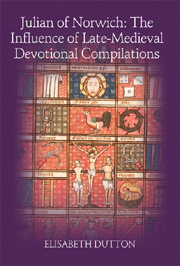Introduction
Published online by Cambridge University Press: 12 September 2012
Summary
Julian of Norwich's Revelation of Love is a landmark in the history of English spiritual writing. It is significant in intellectual terms: one of the first authored works of vernacular theology, it demonstrates the development of the English language as a medium for religious discussion; as a document of its times it bears witness to the vitality of English lay spirituality in the century before the Reformation; as the work of a woman, it draws attention to the active participation of women in late-medieval spiritual culture.
And the Revelation is also, of course, spiritually influential now. In recent years the text has become familiar to many in extract form, passages exemplifying Julian's reassuring wisdom being particularly popular – Julian's assertion that ‘all shall be well’, for example, is much celebrated. But taken within the context of the Revelation as a whole such assertions of faith often trouble rather than resolve. How, Julian asks, shall all be well when such harm is done by sin? writing at a time of plague and persecution Julian grapples with the problem of evil, and with the challenge it presents to those who seek to believe in a loving God. Her apparent struggle to reconcile her inner questioning with the teachings she has received, in visions but also in the teachings of the church, may perhaps be as significant as any conclusions she reaches. Julian's struggle for resolution becomes a struggle with language, a wrestling with words and meanings: indeed, the book is patterned by certain words and phrases which recur again and again with deepening significance.
- Type
- Chapter
- Information
- Julian of NorwichThe Influence of Late-Medieval Devotional Compilations, pp. 1 - 24Publisher: Boydell & BrewerPrint publication year: 2008



